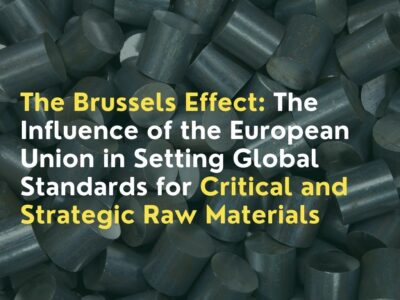
The Brussels Effect: The Influence of the European Union in Setting Global Standards for Critical and Strategic Raw Materials
In today’s interconnected global economy, domestic regulations often influence markets well beyond their borders. The “Brussels Effect” exemplifies how local regulations, particularly from the European Union (EU), reshape international business practices and standards—especially in the area of Critical and Strategic Raw Materials (CSRM).
What is the Brussels Effect?
Coined by Finnish-American author and law professor Anu Bradford in her 2021 book The Brussels Effect: How the European Union Rules the World, the term refers to the EU’s capacity to unilaterally regulate global markets by leveraging its economic and regulatory power. Through expansive regulation, the EU has succeeded in elevating global standards, driving a significant Europeanisation of many key areas of international commerce.
The Brussels Effect, and Critical and Strategic Raw Materials
Critical Raw Materials are minerals and metals identified by the EU as essential to the functioning of the modern economy but facing a high risk of supply disruption. The EU regularly produces and updates a list of these Critical Raw Materials. This list also includes Strategic Raw Materials, which, while not always fitting the list’s determination criteria, present sufficient supply challenges that warrant their inclusion alongside Critical Raw Materials.
As demonstrated in the curve below, few sectors have been under more scrutiny from EU rule-makers as CSRM. EU regulations not only demand diligence be conducted by EU economic actors on their CSRM suppliers, but also establish targets for the use of recycled materials (as opposed to primary, or raw materials), and mandate carbon footprint disclosures for materials imported and/or used within the EU.
Key EU regulations impacting Critical and Strategic Raw Materials
- Corporate Sustainability Due Diligence Directive: Company must identify and mitigate negative impacts on human rights and the environment in their operations and value chains.
- EU Battery Regulation: Requires Due Diligence to be conducted on batteries and sets targets for recycled content, recovery, and carbon footprint declarations.
- EU Forced Labour Ban: Prohibits the import of goods produced using forced labour, with a potentially hefty impact on aluminium sourcing among other CSRM.
- Critical Material Act: Aims to enhance the EU’s capabilities in sourcing, processing, and recycling CSRM.
- Corporate Sustainability Reporting Directive: Establishes mandatory sustainability reporting requirements.
- Conflict Mineral Regulation: Demands that EU importers of tin, tungsten, tantalum, and gold conduct due diligence on their supply chains.
An Opportunity to Increase Sustainability Standards…
By setting up legally binding requirements for responsible CSRM sourcing, the EU’s regulatory impact (and thereby the Brussels Effect) has several positive implications for global supply chains and is primarily characterised by increased sustainability requirements, which in turn drive transparency and level the playing field for responsible businesses. The EU’s strict market access standards push companies worldwide to adopt sustainable practices, effectively exporting higher environmental and social standards.
This shift benefits stakeholders along the CSRM value chain. Higher environmental, social, and governance (ESG) requirements can improve the conditions under which metals and minerals are being mined and manufactured, while benefiting consumers who purchase goods which did not negatively impact the planet or its people along its production process. Furthermore, these regulations level the playing field by ensuring that responsible companies are not at a competitive disadvantage due to higher production costs or more complex supply chains.
As more businesses align with EU standards to maintain market access, those prioritising sustainability no longer bear disproportionate costs, leading to a global drive toward more sustainable practices.
…Which Comes at a Cost
However, more exacting ESG requirements for CSRM production and sourcing may restrict market access for some producers and inadvertently restrict the EU’s access to vital resources, thus potentially hindering its industrial capabilities. The targets for recycled CSRM content also raise concerns about feasibility, given the EU’s current lack of sufficient recycling infrastructure to meet these goals domestically.
Additionally, compliance with these regulations often translates to increased costs for businesses. This burden is particularly acute for emerging economies and smaller suppliers, who may struggle to meet the new standards. As a result, some suppliers may be excluded from the EU market, further restricting the pool of CSRM that meet EU sustainability requirements.
TDi Sustainability is a Trusted Actor to Support Companies Navigating this Regulatory Landscape
As the Brussels Effect continues to shape global norms across various industries, companies must view these standards not just as compliance requirements but as opportunities for innovation, differentiation, and long-term sustainability. TDi Sustainability can assist companies with:
- Gap Assessment and compliance support: We conduct gap assessments against recent and upcoming regulations to verify companies’ readiness and identify areas for improvement.
- Due Diligence Services: We provide comprehensive support for due diligence activities, including the development of tailored due diligence management systems.
- Sourcing Strategies: We assist companies in in developing sourcing strategies to future-proof their access to responsibly sourced materials in the long-term.
- Sustainability Reporting: We support companies in demonstrating their commitment to sustainability principles through comprehensive reporting services.
By partnering with TDi, businesses can turn these regulatory challenges into competitive advantages, contributing to a more sustainable and responsible global future.
Contact our team:
Joséphine Quioc – Sustainability Consultant
TDi Digital
TDi Digital is a comprehensive online platform for responsible supply chain risk management and solutions.
Use TDi Digital to:
– Find out which regulations and voluntary standards apply to your companies and counterparts – screen by material, country and activity
– Integrate into one list requirements from multiple regulations and compare these with your own or suppliers’ management systems
– Support your supply chain due diligence process by assessing a country’s likelihood to meet the OECD’s CAHRA criteria as high, moderate or low risk
– Screen for adverse news around suppliers and materials in your supply chain, and your countries of operation
Go to TDi Digital>
 supply chain
supply chain
Responsible sourcing of sand and silicates | Identifying and mitigating the hidden risk in your supply chains
24th June 2025 supply chain
supply chain
Responsible sourcing of critical minerals for the clean energy transition – The Asian context
6th June 2025 Industry Initiatives
Industry Initiatives
